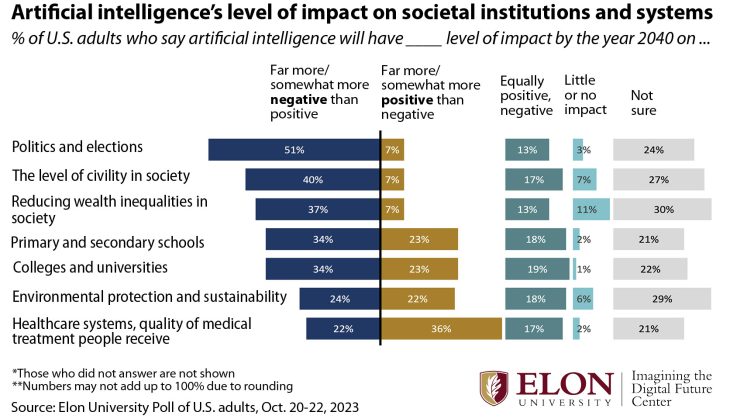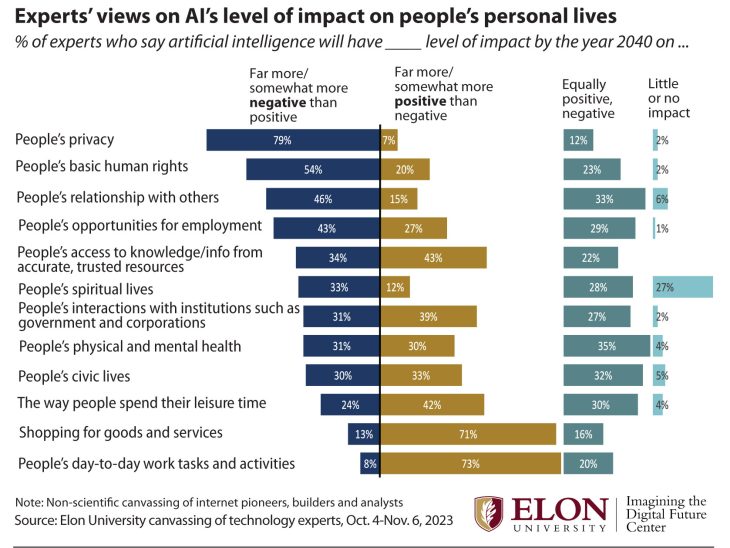Elon University’s new Imagining the Digital Future Center has launched with a report that pairs a national public opinion poll with a survey of tech visionaries.
Technology experts and the U.S. public share serious concerns about the future of privacy, job opportunities, politics and democracy, civility and many other aspects of life, according to a new report from Elon University outlining the potential future impact of artificial intelligence.
This report, “The Impact of Artificial Intelligence by 2040,” finds both the general public and experts believe enormous upheavals are on the horizon as AI spreads. Many experts go so far as to say that we will have to reimagine what it means to be human and that societies must restructure, reinvent or replace existing institutions and systems. At the same time, they embrace the idea that important benefits will also result from the spread of AI.
This is the first report released by Elon’s expanded Imagining the Digital Future Center under the leadership of Lee Rainie, who joined the university after a 24-year career directing Pew Research Center’s Internet and Technology research. The Center works to discover and broadly share a diverse range of opinions, ideas and original research about the impact of digital change, informing important conversations and policy formation.
The new study combines a national public opinion poll with a canvassing of hundreds of technology experts, the hallmark of the 48 previous research reports produced by Elon in partnership with Pew Research Center since 2004.
“This special two-pronged research into public and elite opinion shows how disruptive many think AI will be to essential dimensions of life,” Rainie said. “Both groups expressed concerns over the future of privacy, wealth inequalities, politics and elections, employment opportunities, the level of civility in society and personal relationships with others. At the same time, there are more hopeful views about AI making life easier, more efficient and safer in some important respects. Virtually everyone agrees this is a pivotal moment for how the future plays out with AI.”
Rainie noted that the rapid development of ChatGPT and other AI tools has raised public awareness and caused considerable worry as well as great optimism about the ways AI tools may make life easier, more efficient and potentially safer.
“This special two-pronged research into public and elite opinion shows how disruptive many think AI will be to essential dimensions of life.”
The public opinion poll was designed to focus on the expected impact of AI on a variety of dimensions of personal lives and on the structures of society. The separate canvassing of more than 300 technology experts provided an opportunity for technology developers, business and policy leaders, researchers, analysts and academics to contribute essays about the potential coming impact of AI.
Some envision a future when economies and work are overhauled, people have personal digital assistants and diminished skills in making their own choices, when AI-created deepfakes and disinformation create alternate definitions of “truth,” and when there are major advances in medical diagnostics and treatment.
The National Public Opinion Poll
Two-thirds of Americans believe AI may have a negative impact on their personal privacy and more than half believe there will be negative consequences for their employment opportunities, according to the national public opinion poll conducted by the center.
Those are among the findings of a national public opinion survey sponsored by Elon’s Imagining the Digital Future Center and conducted in partnership with the Elon University Poll, and Ipsos, an international marketing research and polling firm.

More than half of Americans expect negative impacts on politics and elections and 40% look for worsening level of civility in society. The most positive outlook is for the impact of AI on healthcare systems and the quality of medical treatment.
There is no prevailing viewpoint about the overall impact of AI. Asked how the increased use of AI will affect people’s daily lives, 31% say it will be equally positive and negative; 29% said it will be more negative than positive; 17% say it will be more positive than negative; and 23% say they don’t know. On a broad question about AI ethics, 31% say it is possible for AI programs to be designed that can consistently make decisions in people’s best interest in complex situations, while the exact same share say that is not possible. Some 38% say they are not sure.

The poll of 1,021 Americans was conducted Oct. 20-22, 2023, and designed to be representative of the U.S. population. The margin of error is +/- 3.2%.
Comparing expert opinions with the general public’s views
When answering a similar set of questions, the experts agreed with the general public that the impact of AI on privacy is the biggest concern. The experts were far more concerned than the public about a growing wealth inequality in society but somewhat less concerned than the public about the impact on employment opportunities.


The 17th “Future of Digital Life” Experts Canvassing
In addition to answering the quantitative questions, the experts wrote thoughtful essay responses in which they described the challenges and opportunities they see in the digital future. Some said we will have to reimagine what it means to be human and that societies must restructure, reinvent or replace existing institutions and systems. They also spelled out their concerns that AI could greatly enfeeble people in the coming years, while at the same time embracing the idea that seemingly miraculous benefits could result from the spread of AI.
A few of the most intriguing ideas from the experts include the following:
- A new meaning of life will arise in a “self-actualized economy:” Massive AI-generated economic efficiencies that improve work and the way basic infrastructure performs will be combined with medical and other scientific advances that will fundamentally alter the way people act, connect and care for each other.
- There will be a shifting boundary between what’s human and what’s a machine: As AI applications become normalized and ordinary, the things that are considered controversial and dangerous will change from year to year.
- Adjunct intelligence will be everywhere: This will dramatically affect individuals’ sense of identity, perception and even consciousness itself.
- Personal avatars with “self-sovereign identities” will represent us: Individuals will possess 3D, photo-realistic avatars to carry out tasks for them utilizing their comprehensive personal data.
- Digital assistants will have far more influence over their person than their human analogues have over themselves: Engagements with AI provide their creators with intimate insights about users that can be exploited
- People will form intimate and meaningful relationships with their bots: Some will focus most of their human affection, desires and attention on digital products.
- “Truths will be modified”: The AI-abetted spread of deepfakes, disinformation and post-truth content will broaden, and masses of electronic documents will be modified in hindsight to fit special interests’ points of view.
- Shared benefits will transform humanity: The application of AI to achieve long-needed widespread economic change will lead to a more-equitable, sustainable society that relies less on consumption as a driver of productivity and instead evaluates productivity based on “human-flourishing metrics.”
- Creativity will be democratized but may also be homogenized: Those with ideas but not much technical skill will have the tools to create and promote their concepts; this could create a monoculture of outputs.
- An abundance mindset might replace a scarcity mindset: A sufficient combination of intelligence (via AI), matter (via asteroid mining) and energy (from various clean sources) could provide for effectively unlimited material abundance and enable humanity to overcome much of its reason for struggle.
- AI could enable transparency of corporations and governments and expose now-hidden processes: AI systems to aid fact-checking and enable critical inquiry into government and corporate databases might empower citizens and bring suspect or shady practices to light.
“A large share of these global experts and analysts briefly mentioned the great gains they expect, but focused their responses mostly on expressing worries over the potential losses they fear,” said Professor Janna Anderson, founding director of Elon’s Imagining the Internet Center, who has been a co-author of the “Future of Digital Life” reports since they began in 2004. “Their concerns are reflected in the five overall themes we found in our analysis of their responses.”
An analysis of the experts’ responses surfaced five major themes:
Theme 1 – We will have to reimagine what it means to be human
As AI tools integrate into most aspects of life, some experts predict the very definition of a “human,” “person” or “individual” will be changed. Among the issues they addressed: What will happen when we begin to count on AIs as equivalent to – or better than – people? How will we react when technologies assist, educate, and maybe share a laugh with us? Will a human/AI symbiosis emerge into a pleasing partnership? Will AI become part of our consciousness
Theme 2 – Societies must restructure, reinvent or replace entrenched systems
These experts urge that societies fundamentally change long-established institutions and systems – political, economic, social, digital, and physical. They believe there should be major moves toward a more equitable distribution of wealth and power. They also argue that the spread of AI requires new multistakeholder governance from diverse sectors of society.
Theme 3 – Humanity could be greatly enfeebled by AI
A share of these experts focused on the ways people’s uses of AI could diminish human agency and skills. Some worry it will nearly eliminate critical thinking, reading and decision-making abilities and healthy, in-person connectedness, and lead to more mental health problems. Some said they fear the impact of mass unemployment on people’s psyches and behaviors due to a loss of identity, structure and purpose. Some warned these factors combined with a deepening of inequities may prompt violence.
Theme 4 – Don’t fear the tech; people are the problem and the solution
A large share of these experts say their first concern isn’t that AI will “go rogue.” They mostly worry that advanced AI is likely to significantly magnify the dangers already evident today due to people’s uses and abuses of digital tools. They fear a rise in problems tied to extractive capitalism, menacing and manipulative tactics exercised by bad actors, and autocratic governments’ violations of human rights.
Theme 5 – Key benefits from AI will arise
While most of these experts wrote primarily about the challenges of AI, many described likely gains to be seen as AI diffuses through society. They expect that most people will enjoy and benefit from AI’s assistance across all sectors, especially in education, business, research and medicine/health. They expect it will boost innovation and reconfigure and liberate people’s use of time.



